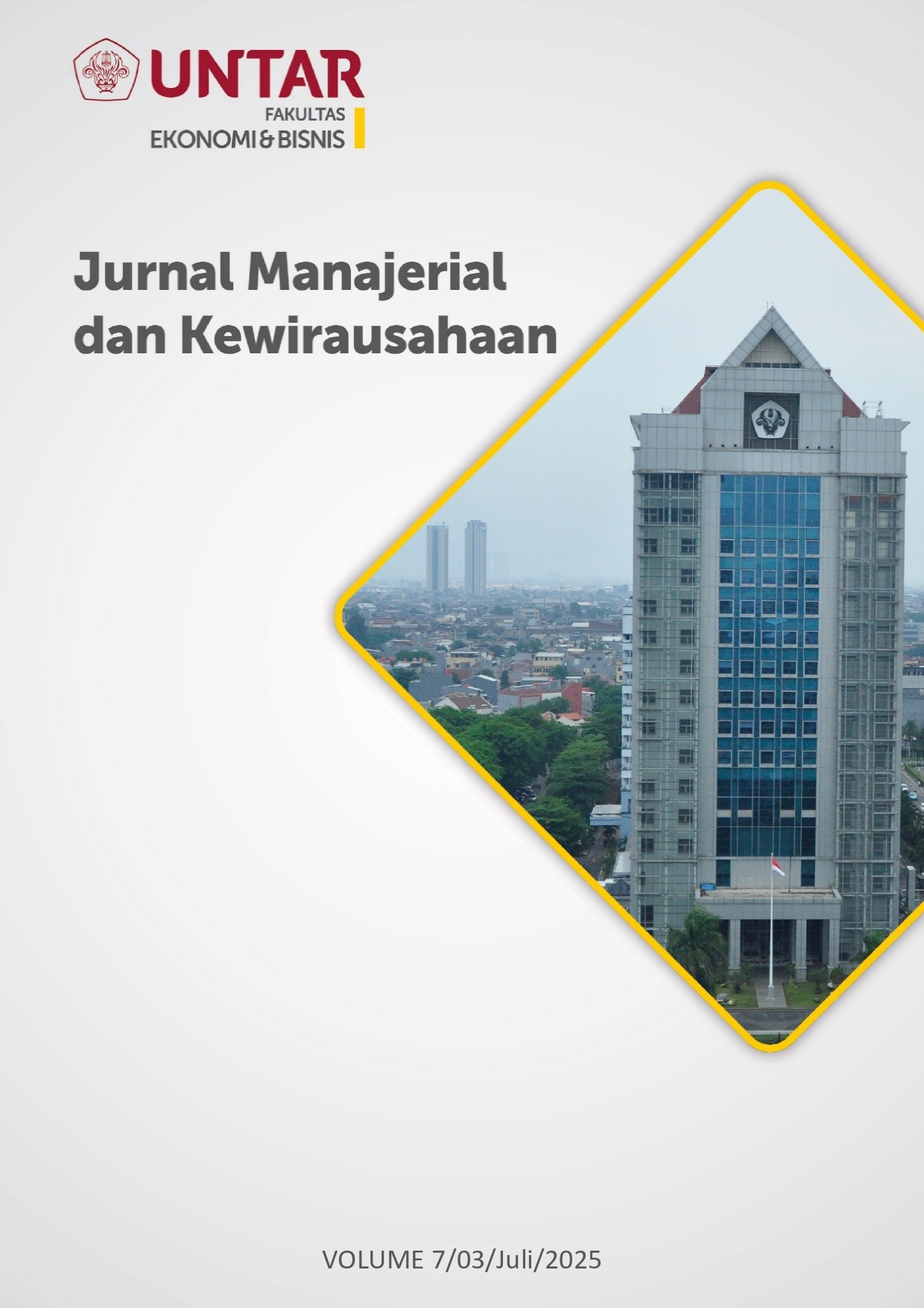Analisis Hedonisme, Persepsi Harga, Informasi, dan Kepercayaan terhadap Intensi Pembelian Online Produk Fashion di Indonesia
Main Article Content
Abstract
Penelitian ini bertujuan untuk menguji pengaruh (1) hedonisme, (2) persepsi harga, (3) informasi, dan (4) kepercayaan terhadap intensi pembelian online produk fashion di Indonesia. Data dikumpulkan melalui kuesioner daring dengan 222 responden menggunakan teknik non-probability sampling. Analisis dilakukan menggunakan Partial Least Squares-Structural Equation Modeling (PLS-SEM). Hasil menunjukkan bahwa (1) hedonisme, informasi, dan kepercayaan berpengaruh positif terhadap intensi pembelian online, (2) persepsi harga berpengaruh positif melalui mediasi hedonisme, serta (3) informasi berpengaruh positif terhadap kepercayaan. Temuan ini memberikan wawasan strategis bagi pelaku bisnis fashion untuk meningkatkan daya tarik dan kepercayaan konsumen melalui platform daring. Studi ini menyoroti pentingnya aspek emosional, ulasan daring, dan kepercayaan dalam memengaruhi keputusan pembelian konsumen.
This research aims to examine the influence of (1) hedonism, (2) price perception, (3) information, and (4) trust on online purchase intention of fashion products in Indonesia. Data was collected through an online questionnaire with 222 respondents using non-probability sampling technique. The analysis was conducted using Partial Least Squares-Structural Equation Modeling (PLS-SEM). The results show that (1) hedonism, information, and trust positively influence online purchase intention, (2) price perception has a positive influence through hedonism mediation, and (3) information positively influences trust. These findings provide strategic insights for fashion businesses to enhance consumer appeal and trust through online platforms. This study highlights the importance of emotional aspects, online reviews, and trust in influencing consumer purchase decisions.
Article Details
Section

This work is licensed under a Creative Commons Attribution-NonCommercial-ShareAlike 4.0 International License.
This work is licensed under a Jurnal Muara Ilmu Ekonomi dan Bisnis Creative Commons Attribution-ShareAlike 4.0 International License.,/p>
References
BPS. (2023). Laporan Perekonomian Indonesia 2023. https://www.bps.go.id/id/publication/2023/09/21/a62efbad86d18bc35581c33a/indonesian-economic-report--2023.html, diakses pada tanggal 5 April 2025.
Calvin, N., & Keni, K. (2024). Pengaruh EWOM, trust, dan perceived hedonic value terhadap minat beli konsumen pada produk e-commerce. Jurnal Manajerial dan Kewirausahaan, 6(1), 80–91. https://doi.org/10.24912/jmk.v6i1.28574
Chen, A., Chen, Y., Li, R., & Lu, Y. (2024). The interaction between the anchor and customers in live-streaming E-commerce. Industrial Management & Data Systems, 124(6), 2151-2179. https://doi.org/10.1108/IMDS-07-2023-0513
Cheong, J. W., Muthaly, S., Kuppusamy, M., & Han, C. (2020). The study of online reviews and its relationship to online purchase intention for electronic products among the millennials in Malaysia. Asia Pacific Journal of Marketing and Logistics, 32(7), 1519-1538. https://doi.org/10.1108/APJML-03-2019-0192
Chomeya, R. (2010). Quality of psychology test between Likert scale 5 and 6 points. Journal of Social Sciences, 6(3), 399-403.
Emmanuel-Stephen, C.M., & Gbadamosi, A. (2022), "Hedonism and luxury fashion consumption among Black African women in the UK: an empirical study", Journal of Fashion Marketing and Management, Vol. 26 No. 1, pp. 126-140.
Hair, J. F., Risher, J. J., Sarstedt, M., & Ringle, C. M. (2019), "When to use and how to report the results of PLS-SEM", European Business Review, Vol. 31 No. 1, pp. 2-24.
Li, H., Meng, F., & Pan, B. (2020), "How does review disconfirmation influence customer online review behavior? A mixed-method investigation", International Journal of Contemporary Hospitality Management, Vol. 32 No. 11, pp. 3685-3703.
Malhotra, K. N. (2019) Marketing research : an applied approach / Naresh K. Malhotra, Daniel Nunan, David F. Birks.
Reyvina, R., & Tunjungsari, H. K. (2022). The effect of consumer innovativeness on purchase intention of new smartphone with vicarious innovativeness and perceived value as mediations. Dalam Proceedings of the tenth International Conference on Entrepreneurship and Business Management 2021, 582-588. https://doi.org/10.2991/aebmr.k.220501.088
Sarraf, M. & Bruneau, M. (1998). Ductile sismic retrofit of steel deck-truss bridges, II: Design applications. J. Struct. Engrg., 124(11), 1263-1271.
Sekaran, U., & Bougie, R. (2016). Research Methods for Business.
Sugiyono. (2013). Metode penelitian kuantitatif, kualitatif dan R&D. Alfabeta Bandung.
Sumarliah, E., Usmanova, K., Mousa, K., & Indriya, I. (2021). E-commerce in the fashion business: the roles of the COVID-19 situational factors, hedonic and utilitarian motives on consumers’ intention to purchase online. International Journal of Fashion Design, Technology and Education, 15(2), 167–177.
Suryani, S., & Koranti, K. (2022). Kualitas pelayanan, kepercayaan dan keamanan serta pengaruhnya terhadap kepuasan pelanggan melalui sikap pengguna e-commerce. Jurnal Ilmiah Ekonomi Bisnis.
Tiwari, A.V., Bajpai, N., Singh, D., & Vyas, V. (2022), "Antecedents of hedonism affecting memorable tourism experience (MTE) leading to revisit intention in tourists", International Journal of Tourism Cities, Vol. 8 No. 3, pp. 588-602.
Zhong, Y. P., & Moon, H. C. (2020). What drives customer satisfaction, loyalty, and happiness in fast-food restaurants in China? Perceived price, service quality, food quality, physical environment quality, and the moderating role of gender. Foods, 9(4), 660.

